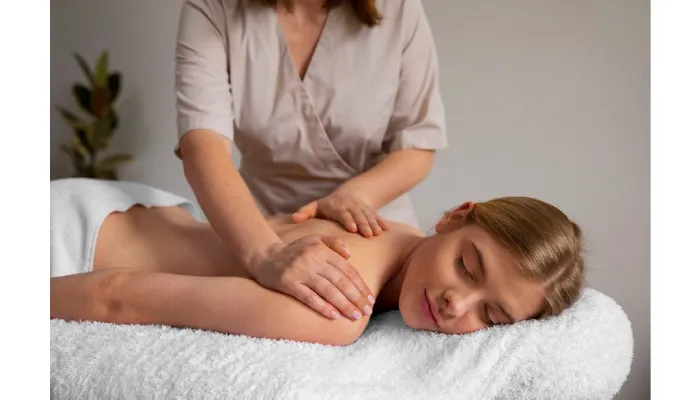Massage therapy in Milton offers more than just relaxation. One key benefit is it helps with injury recovery by reducing inflammation and breaking down scar tissue, which supports faster healing and improved mobility. It also enhances mental well-being by lowering anxiety and boosting mood through the release of natural endorphins. Another advantage is the boost to your immune system; regular sessions improve lymphatic drainage that helps remove toxins from your body. Plus, massage improves circulation and flexibility, speeding up recovery from muscle fatigue while helping prevent injuries. Lastly, it lowers stress hormones like cortisol, promoting better sleep quality for overall health.
Supports Injury Recovery by Reducing Inflammation and Scar Tissue
Massage therapy is an effective way to support injury recovery by addressing inflammation and scar tissue buildup. It helps reduce swelling around injured areas, which speeds up the healing process by allowing oxygen and nutrients to reach damaged tissues more easily. Techniques like deep tissue massage work to break down adhesions and scar tissue, which often restrict movement and cause stiffness. This improved mobility not only eases pain but also helps restore function faster. Additionally, massage encourages better blood flow and lymphatic drainage, reducing fluid buildup that leads to swelling and discomfort. When combined with physiotherapy, massage can target soft tissue restrictions that exercise alone might miss, preventing tight scar tissue from forming after surgeries or injuries. By relaxing muscle tension and promoting parasympathetic nervous system activity, massage creates an optimal environment for healing while reducing compensatory movement patterns that might otherwise worsen the injury.
Enhances Mental Well-being by Lowering Anxiety and Boosting Mood
Massage therapy helps the body release endorphins and serotonin, natural chemicals that lift mood and create a sense of well-being. The peaceful setting during a session calms the mind, reducing stress and quieting anxious thoughts. By easing muscle tension, massage also lowers physical discomfort, which can contribute to feelings of anxiety. It decreases cortisol, a hormone linked to stress, helping break the cycle of chronic tension. The human touch involved provides comfort and a sense of connection, which many find grounding and emotionally stabilizing. Regular massage can improve focus and mental clarity, while better sleep quality after sessions supports emotional balance. For those experiencing mild depression, massage encourages positive changes in brain chemistry, often resulting in a noticeable mood boost and reduced symptoms.
- Massage promotes the release of endorphins and serotonin, chemicals that improve mood naturally.
- The calming environment during massage helps reduce stress and quiet the mind.
- Reduced muscle tension from massage can lead to less physical discomfort, lowering anxiety.
- Massage lowers cortisol levels, a hormone linked to stress and anxiety.
- Regular massage sessions can contribute to clearer thinking and improved focus.
- The human touch involved in massage provides comfort and a sense of connection.
- Massage therapy helps break the cycle of chronic stress by encouraging relaxation.
- Improved sleep from massage further supports mental health and emotional balance.
- Massage can reduce symptoms of mild depression by encouraging positive brain chemistry changes.
- Clients often report feeling more grounded and emotionally stable after massage therapy.
Boosts Immune Function Through Improved Lymphatic Drainage
Massage therapy stimulates the lymphatic system, which plays a key role in removing waste and toxins from the body. By applying gentle pressure and rhythmic movements, massage encourages lymph nodes to drain more effectively, helping the body clear out pathogens and other harmful substances. This improved lymph flow supports the immune system by allowing immune cells to travel more efficiently to areas where they are needed, enhancing the body’s natural defense mechanisms. Additionally, massage increases overall circulation, which further aids immune cell movement and boosts detoxification. Regular sessions can reduce the frequency and severity of common illnesses like colds and flu, as many clients report fewer symptoms after consistent therapy. Massage also helps lower stress hormones such as cortisol, which can suppress immune function when elevated. By balancing the autonomic nervous system, massage creates a healthier internal environment that supports stronger and more resilient immune responses. This combination of improved detoxification, reduced inflammation, and stress relief makes massage a valuable tool for maintaining overall wellness and immune health.
Improves Circulation and Flexibility for Faster Healing
Massage therapy boosts blood flow to muscles and joints, supplying oxygen and nutrients essential for tissue repair. This enhanced circulation also helps flush out waste products that build up during injury or exercise, supporting quicker recovery. By loosening tight muscles and fascia, massage improves flexibility and range of motion, which lowers stiffness and reduces the chance of muscle strains. It also breaks down adhesions that restrict movement and cause discomfort. Over time, regular massage leads to better muscle elasticity and joint lubrication, aiding joint health by balancing muscle tension. For athletes and active individuals, increased flexibility helps maintain performance and prevent injuries. Improved mobility from massage not only speeds healing but also supports daily function and reduces the risk of chronic pain.
Reduces Stress Hormones and Encourages Better Sleep
Massage therapy helps lower cortisol, the stress hormone that can disrupt overall health when elevated. By easing muscle tension, massage allows the body to enter a more relaxed state, making it easier to fall asleep and stay asleep. It also encourages the release of melatonin, the hormone responsible for regulating sleep cycles, which contributes to deeper, more restful sleep. Many clients report improved sleep quality after massage sessions, which not only supports physical recovery but also enhances mental clarity and energy the next day. Additionally, massage calms the nervous system, helping reduce anxiety and symptoms of insomnia. This relaxation response slows the heart rate and lowers blood pressure before bedtime, setting the stage for a more peaceful night. Over time, regular massage can help establish healthier sleep patterns, offering a natural way to combat restless nights and improve overall well-being.
Resource URL:
https://newheightsphysiotherapy.ca/services/massage-therapy-in-milton-ontario/
https://en.wikipedia.org/wiki/Attachment_therapy

Mary Burns is a dedicated writer focusing on health and fitness topics. With a passion for promoting wellness and vitality, Mary shares her knowledge and expertise through engaging and informative blog posts.




